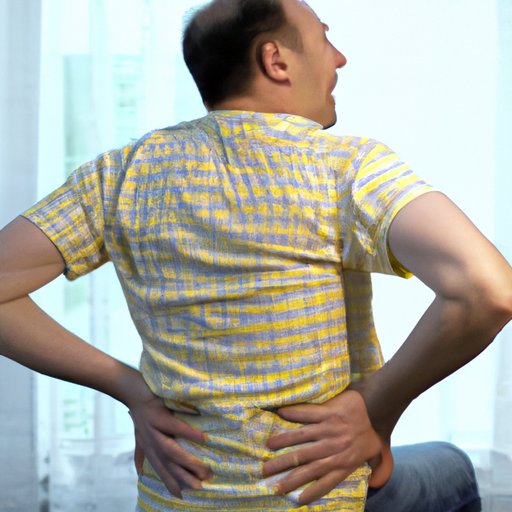
Introduction
Lower back pain can be caused by various factors, including physical strain and injury, but did you know that stress can also be a major contributor? In this article, we’ll explore the link between stress and lower back pain, and provide practical advice on how to alleviate this type of pain through stress reduction and lifestyle changes.
The Link Between Stress and Lower Back Pain: Understanding the Connection
Stress is a natural response to perceived threats or challenges, but when it becomes chronic, it can take a toll on the body. One common physical response to stress is muscle tension, which can lead to pain and discomfort in various parts of the body, including the lower back.
Research has shown that there is a clear connection between stress and lower back pain, but the exact mechanisms behind this link are still being studied. Some theories suggest that stress may trigger inflammation in the body, which can cause pain and discomfort in the lower back. Others suggest that stress can lead to changes in the nervous system, which may contribute to the development and exacerbation of lower back pain.
Regardless of the exact mechanisms at play, it’s clear that reducing stress can help alleviate lower back pain caused by stress. Studies have found that individuals who participated in stress reduction programs experienced significant reductions in their lower back pain levels.
Stressed Out and Sore: Identifying the Symptoms of Lower Back Pain Caused by Stress
Lower back pain caused by stress can manifest in various ways, and it’s important to be able to recognize the symptoms. Some common symptoms may include:
- muscle tension or stiffness in the lower back
- sharp or dull pain in the lower back that may worsen with certain activities
- headaches or migraines that coincide with lower back pain
- fatigue or difficulty sleeping
It’s important to note that these symptoms may differ from other types of lower back pain, such as pain caused by physical injury or inflammation. Identifying these symptoms can help individuals seek appropriate treatment and relief from stress-related lower back pain.
Breaking the Cycle: How to Relieve Stress-Related Lower Back Pain
There are various treatment options available for stress-related lower back pain, including medication, physical therapy, and chiropractic care. However, alternative therapies may also be beneficial for reducing stress and alleviating lower back pain.
Massage therapy can help reduce muscle tension and improve circulation, which can alleviate lower back pain caused by stress. Acupuncture may also be effective for reducing stress levels and treating lower back pain. Additionally, meditation and relaxation techniques can help individuals manage stress and reduce their lower back pain levels.
It’s also important to make lifestyle changes that can help reduce stress levels and improve overall health. Regular exercise, a healthy diet, and getting enough sleep can all help reduce stress and alleviate lower back pain. It may also be helpful to limit caffeine and alcohol intake, as these substances can increase stress levels and exacerbate lower back pain.
Mind Over Matter: The Power of Mental Health in Alleviating Lower Back Pain
Research has shown that mental health plays a significant role in reducing stress-related lower back pain. Mindfulness-based techniques such as meditation, yoga, and breathing exercises have been shown to be effective for reducing stress and improving overall well-being.
These techniques can help individuals develop coping skills and reduce their perception of pain, which may be helpful for managing stress-related lower back pain. Additionally, cognitive-behavioral therapy (CBT) may be effective for addressing the psychological factors that contribute to stress-related lower back pain.
Stress Less, Move More: Combating Lower Back Pain through Lifestyle Changes
Finally, making lifestyle changes can also be effective for reducing stress and alleviating lower back pain. Regular physical activity can help reduce stress levels and strengthen the muscles in the lower back, reducing the risk of pain and injury. A healthy, balanced diet can also provide the nutrients the body needs to function well and manage stress.
Getting enough sleep is also crucial for reducing stress levels and managing lower back pain. Creating a relaxing bedtime routine and limiting screen time before bed can help promote better sleep. Additionally, seeking support from friends, family, or a mental health professional can also be helpful for managing stress levels and reducing lower back pain.
Conclusion
Lower back pain caused by stress can be a frustrating and debilitating condition, but taking steps to reduce stress levels and make lifestyle changes can be effective for alleviating this type of pain. By recognizing the symptoms of stress-related lower back pain and seeking appropriate treatment and support, individuals can take control of their health and improve their overall well-being.
If you’re experiencing lower back pain caused by stress, it’s important to seek medical advice and develop a treatment plan that works for you. With time, patience, and a commitment to stress reduction and self-care, you can reduce your stress levels and enjoy a more pain-free life.





